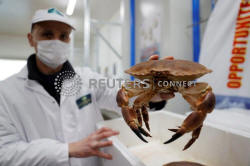'We've lost 30 years': Brexit shatters supply chains for French fish hub
 Send a link to a friend
Send a link to a friend
 [January 13, 2021] By
Richard Lough [January 13, 2021] By
Richard Lough
BOULOGNE-SUR-MER, France (Reuters) - French
fishmongers and seafood factories are suspending orders from Britain and
battling to salvage just-in-time supply chains, after they were upended
by post-Brexit red tape that impedes next-day delivery of salmon and
lobster from Britain to Europe.
Importers in Boulogne-sur-Mer told Reuters that deliveries were
sometimes being held up because the Latin names of fish species were
incorrectly entered on papers.
Other reasons for delays included sanitary certificates missing the
required stamps and French agents adopting a zero-tolerance approach to
mistakes in the cumbersome process.
The result is a chaotic breakdown in supply chains from the outer
reaches of the British Isles to the northern French port of Boulogne,
which used to see Scottish langoustine and scallops in French shops just
over a day after they were harvested.

Deliveries were taking at least one or two days longer than previously,
if they got through at all.
"We've never known such delays," said Arnaud Mille, head of sourcing at
Demarne Freres, who counts Britain as his number one supplier. "It's
been apocalyptic."
Now in its second week, the disruption meant it was almost impossible
for importers to place orders in a truck carrying multiple consignments
from different suppliers.
Mille said he had sent an SMS message to French customs officials asking
them to go easy while the industry learned to navigate the new
bureaucracy, but was yet to receive a response.
The delays mean seafood is not always hitting European markets as fresh
as it once did. In a consignment of English-caught crab that arrived at
Mille's warehouse a day late on Saturday, 20% of the crustaceans had
perished.
Brexit had undone decades of cooperation to finesse the supply chain,
some importers in Boulogne, Europe's biggest fish processing centre,
said.
"We've lost 30 years," said Mille.
SENDING FISH TO MARS
Britain's divorce from the EU heralded the return of a customs border
and additional paperwork and costs. Those moving seafood from Britain
into the bloc face some of the toughest requirements, including
mandatory sanitary checks.
Stephane Pruvost, chief executive of fish processor JP Maree, said he
had suspended all imports from Britain. For now he was trying to fill
the gap in his salmon and monkfish orders from markets such as Norway
and Denmark.
[to top of second column] |

Arnaud Mille, head of sourcing at Demarne Freres, shows a dead crab
due to the delivery time in his fish processing plant in the port of
Boulogne-sur-Mer, France, January 11, 2021. REUTERS/Pascal Rossignol

"When you have fewer sellers, there's less choice on price, and sometimes
quality," he said. "For now we've no other choice."
Scottish truck driver Robert Marshall spent a day sat in his cab at Boulogne's
sanitary control checkpoint, a few hundred metres from the hangar-like complex
where he was to drop off his salmon cargo, waiting for a snag with his customs
documents to be fixed.
"My wheels are not turning so I'm not making money," the ex-soldier said. "I'll
be looking at this over the next couple of months to see if it's viable."
Sanitary control agents were conducting tests on 15% of consignments of
wild-caught fish and 30% of farmed fish and molluscs, said Charles-Henri Goeury,
head of Boulogne's SIVEP checkpoint. The checks involved opening iced crates to
check the merchandise was fresh and conserved at the correct temperature.
He denied trucks had been held up for hours because of the checks, pointing
instead to customs paperwork. His team had been flexible with minor
administrative oversights but would soon get stricter, he said.
Fish exports have also been hit in the opposite direction.
The need for Boulogne wholesalers to obtain the license, signature and boat
registration of each skipper made it impossible to send a mixed load of mullet
from France, turbot from Belgium and sea urchins from Spain to a buyer in
Britain. Customs charges added hundreds of euros to costs.
In charge of exports at L'Argonaute, Pierre Haem said he had spent more time
chasing papers than selling fish since Jan. 1, and had resorted to shipping only
squid.

"Sending fish to London used to be as simple as selling it down the end of the
road," Haem said. "Now it's like sending fish to planet Mars."
(Reporting by Richard Lough; Editing by Mike Collett-White)
[© 2021 Thomson Reuters. All rights
reserved.] Copyright 2021 Reuters. All rights reserved. This material may not be published,
broadcast, rewritten or redistributed.
Thompson Reuters is solely responsible for this content. |